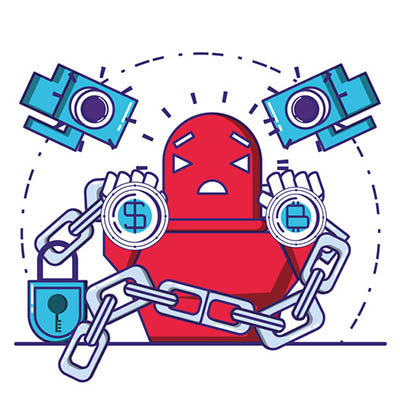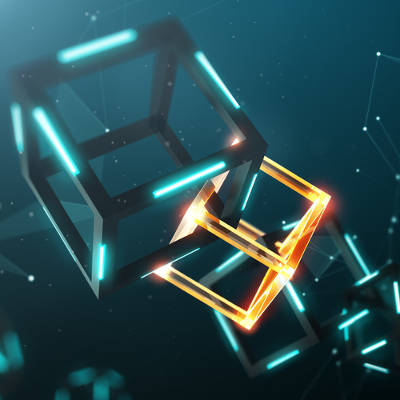Will Your Online Privacy Be Better Using Blockchain?

Blockchain has been an especially hot topic as of late, especially with the recent meteoric rise in the value of most cryptocurrencies. With all the focus directed to Bitcoin, it is easy to forget that the blockchain has other uses – uses that are geared toward increased cybersecurity, transparency, and privacy.
This Week’s Tech Term: Blockchain

As one of the most important emerging technologies out there at the moment, speculation about blockchain, and its growing list of practical applications, has run rampant. Soon, someone will come out with a blockchain application that makes and delivers pizzas. In all seriousness, it really holds a lot of promise for the development of interesting applications. For this week’s tech term, we look at the blockchain.
What Else Can Blockchain be Used For?

Cryptocurrency, most notably Bitcoin, has made the headlines in recent months with huge fluctuations in supposed value. While the topic of cryptocurrency is one that would take far more than a single blog post to discuss, we can examine the technology that allows these currencies to exist and posit what it could likely be used for in the near future.
Identity Authentication
While privacy and anonymity are big concerns in online computing, sometimes it is especially important that you can confirm that you are who you say you are. Blockchain technology can make authentication much easier, whether its regarding digital identities, passports, birth certificates, or wedding certificates. Instead of relying on the relatively insecure measures that we do today, we soon may use blockchain technology to safely track and store the identification that we need to navigate so much of modern life.
Notary Functions
Many documents require a notary in order to be signed, the notary serving as a neutral third-party present to ensure that all parties have signed the document of their own volition. However, the blockchain’s features allow it to largely act as a notary. By timestamping when data was introduced to the blockchain, the entire chain more or less serves as a witness to the data’s validity.
Voting
On a related note, blockchain may help to make the democratic process more transparent and secure against tampering through voter fraud. By leveraging the blockchain as a part of the voting process, the identity of each voter can be unquestionably verified, and their vote cemented into an unalterable record.
Automated Contracts
The blockchain can even serve as an executor of a contract, automating agreements that are triggered when agreed-upon terms are met. By populating a smart contract with the information on the two parties, as well as the payment information and conditions, the blockchain allows the terms of an agreement to be fulfilled automatically once the conditions are met.
While cryptocurrency may have most of the attention at the moment, the blockchain is far from a one-trick pony. What else would you like to see developed as a function fulfilled through the blockchain? Let us know in the comments!
You Should Care About Blockchain Technology

We often go into depth about technology, management, and other business-oriented topics, and occasionally we decide to talk about a technology that may not be all that familiar to people with the hope that a short primer on the subject will ultimately help our readers to become curious and do their own research to understand the technology better. With Bitcoin being a trending topic in the news, understanding what a blockchain is will help you understand how this technology will drive data security in the coming years.
First, What Is Bitcoin?
Bitcoin is a type of digital currency. Bitcoin doesn’t exist physically, such as coinage or paper money does, but instead exists in code form. The interesting thing about Bitcoin is how it’s generated. Users can utilize high-end computing hardware (even commercially available computer hardware) to “mine” for Bitcoin and simply invent the money. Granted, there is a limited supply of Bitcoin and generating even a small amount of Bitcoin requires a lot of computer resources and a lot of time. That said, Bitcoin has become a viable currency online for many online stores. At the time of writing this, a single Bitcoin is worth about $ 17,112 USD, compared to $ 27 back in 2009.
What is Blockchain?
A blockchain is exactly as the name suggests, a series of blocks that contain information, chained together to provide a reliable and secure accounting for whatever the blockchain is set up to measure. The technique of blockchaining originated in 1991 and was developed to timestamp documents to ensure they couldn’t be tampered with or altered. It has since been tabbed “The Internet of Value” since it functions as a form of database. The differences between traditional databases and a blockchain are numerous, however.
In a blockchain, the information that is shared is both confirmed and encrypted; and, distributed over a number of linked transactions; and, automatically replicated by each user that uses the blockchain, providing users of the chain a secure and tamper-proof ledger of secure activity. This activity can be exchanges in currency, cryptocurrency, medical records, shareholder records, etc.–any information that requires a itemized and uneditable database in which to relay information.
Uses of Blockchain
Blockchain technology has been described by industry professionals as the “new Internet”, but since a majority of people have never heard of it, we thought it would be good to provide some examples of technologies that would benefit from moving on from the centralized hosted technologies that we have today to distributed hosting like blockchain. Here are a few:
- Security: The decentralization of data makes it exponentially safter to save files in multiple locations.
- Data Management: The verification data is completely transformed and more robust with blockchain.
- Logistics: Individual goods can be traced to their origin, giving companies and consumers enhanced transparency.
- Investing: Smart contracts using blockchain provide strong security for crowd-based funding and other investment.
- Internet of Things: Provides a construct to assign automation for remote systems, and the smart contracts required to give their consumers peace of mind as many IoT devices come with some privacy concerns.
Blockchain and Bitcoin
With Bitcoin being a hot-button issue in financial circles of late; and, with other cryptocurrencies popping up all the time, you can see how blockchain technology creates a construct in which a digital currency could thrive. Since there will never be more than 21 million Bitcoins in circulation, people that choose to “mine” the Internet for this cryptocurrency do so with the understanding that today it would take a hundred years or more to mine one single Bitcoin. This ceiling protects the currency from inflation. Bitcoin miners have responded, building Application Specific Integrated Circuit (ASIC) systems to specifically mine for Bitcoins, but so many people have started to mine for them (especially as their value has started to increase) that new strategies have to be implemented in order for any of these miners are to hit paydirt, so to speak. Today, many of the so-called Bitcoin miners actually mine pools of data for small pieces of BitCoin.
What a Bitcoin is worth today is what the market for Bitcoins says it’s worth–no more, no less; and, since it uses blockchain technology, you can bet that any Bitcoin that is available, is legitimate. Since users expect almost 95% of all the Bitcoins there will ever be to be released by 2024, speculators are now saying that by then a single bitcoin could be worth a staggering $ 250,000. In fact, the demand is seemingly so high that some financial institutions have started offering investors the chance to invest in Bitcoin futures, suggesting that they completely believe in the stability of the Bitcoin market; a testament to the viability and reliability of blockchain technology.
The blockchain is definitely going to be a household name soon, but for now, we hope this article can give you a small look at the technology that will help the Internet of Things be the biggest shift in technological advancement this world has ever seen. Do you have any Bitcoin, or do you know about cryptocurrency? Do you think digital money is the future of currency? Leave your thoughts with us in the comments section below.

